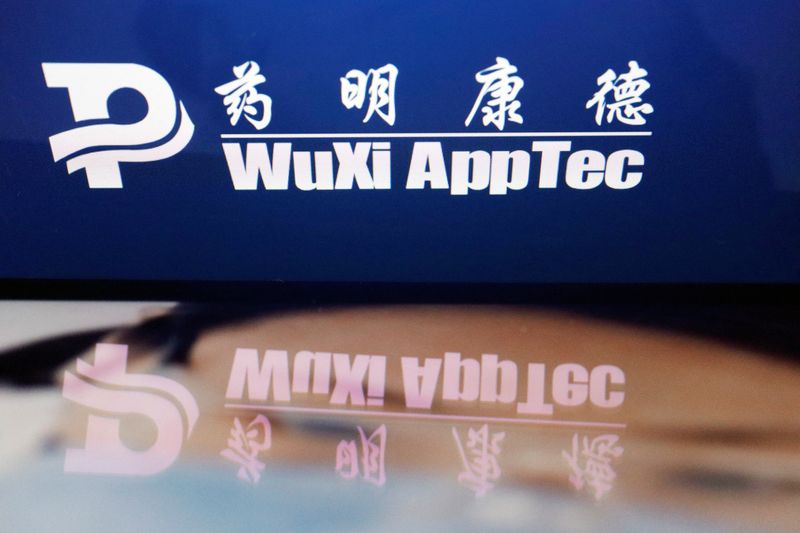By Andrew Silver
SHANGHAI (Reuters) -A draft U.S. bill that has triggered a sell-off in shares of China's biotech firm Wuxi Apptec could deal a major blow not just to the firm but could also impact many labs and Western drugmakers that rely on it for research and manufacturing, public data showed.
A congressional committee focused on China introduced a bill late last month that would restrict federally funded medical providers from allowing China's BGI Group, Wuxi Apptec and other biotech firms from getting genetic information about Americans.
Similar legislation was introduced in the Senate to prohibit federal agencies from contracting with those firms and also stop the government from entering into contracts with companies that use their equipment or services. The bill has a long path forward before potentially becoming law.
Wuxi AppTec's shares, listed in Shanghai and Hong Kong, have since tumbled nearly 50%. Its Hong Kong shares rose 4% on Monday, while Shanghai shares dropped 4% after the company said it has no links with any governments or their military institutions and does not collect human genomic data in any of its business.
Founded in 2000 by its chairman and CEO Ge Li, who earned a doctoral degree in organic chemistry from Columbia University, Wuxi has grown to a leading company offering early drug research and development services and contract manufacturing for Western companies, according to its website.
The company or its affiliate Wuxi Biologics have counted Pfizer (NYSE:PFE), AstraZeneca (NASDAQ:AZN) and GlaxoSmithKline (NYSE:GSK) as well as state-funded U.S. labs as its partners. Their projects include a research on Alzheimer's disease with researchers from Pfizer, a vaccine component production deal with AstraZeneca and a licensing agreement with GSK on antibodies for cancer research.
The Lawrence Livermore National Laboratory has also used Wuxi's services on an antivirals lab project, using virtual compounds synthesized by Wuxi AppTec, according to a 2022 report from the U.S. Department of Energy Office of Scientific and Technical Information.
AstraZeneca, Pfizer and GSK did not immediately respond to requests for comment.
A spokesperson for Lawrence Livermore National Laboratory said it had no active orders or collaborations with Wuxi AppTec or its affiliates, nor outstanding orders or pending contracts with them. It declined to comment on the bill or its potential impacts.
The Wuxi group also has a large presence in the United States with multiple offices including a lab testing facility in New Jersey that it said in 2018 would be "one of the largest" labs for drug development testing in the country. Services it offers in the U.S. include cell and gene therapy manufacturing and biologics testing, according to its website.
Such projects and expansion work helped the U.S. market become the biggest source of revenue for Wuxi AppTec, accounting for two thirds of its total revenue of 29.5 billion yuan ($4.10 billion) in the first nine months of 2023.
"The proposed bills are still in their early stages in the legislative process," said Yiming Liu, a partner at Cooley LLP. "There is no set timeline for when either chamber of Congress must consider the bills."
Analysts, however, caution Wuxi shares would continue to come under pressure.

"This is an investor confidence problem ... this year is the U.S. election year, so there could be a lot of similar news in terms of restrictions on China (companies) going forward that weigh on investor confidence," said Steven Leung, director of institutional sales at UOB Kay Hian in Hong Kong.
($1 = 7.1979 yuan)